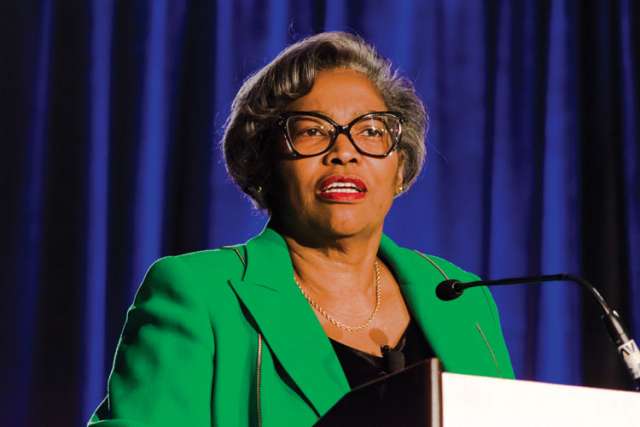“Knowing the importance of these books in children’s lives I encourage you to ask your teachers to find books that do not alienate the children,” she said. “Non-fiction reading and writing is one of the best ways of influencing a students’ literacy.”
On April 25 Glaze delivered a keynote address at the annual conference held by the Catholic Principals’ Council of Ontario. More than 250 Catholic education leaders attended the three-day event at the Westin Harbour Castle in Toronto.
Although Glaze acknowledged the importance of other subjects, specifically math, she stressed that literacy must be a primary focus of the classroom.
“With a lot of children who are not reading, if you had more time for literacy I don’t think anyone is going to put you in jail for that,” she said. “Some children need a lot more time because unless they can read they will not be able to do mathematics either. They cannot read the math problems if they cannot read so making sure that you have a timetable with uninterrupted blocks of time for literacy and numeracy is essential when you are dealing with children who live in poverty.”
She continued by saying that principals must make it a priority for their teachers to provide the additional support, be it in class or after school, to students struggling with literacy. To aid in these efforts Glaze suggested calling on alumni to volunteer as peer tutors.
“There are two things that do not cost money,” she said. “The use of volunteers and the use of cross-age peer tutoring. It costs you time but not money.”
Glaze was speaking from exoerience. While serving the Peterborough area as a director of education, Glaze employed this tactic to raise literacy rates.
During an extensive career, which began as a teacher at St. John the Evangelist in Toronto, Glaze has taught in classrooms from the elementary level to post-secondary, served as the educational officer with Ontario’s Ministry of Education and was selected by the federal government to assist with educational reform in South Africa.
Glaze praised the work being done in Ontario in terms of improving student success and achievement, but not without a little criticism.
“I must say that as educators, as principals, you are making a difference,” she said. “I am still not satisfied that we are educating all children to the maximum extent possible. I am never satisfied, I am always challenging you and pushing you to do more, but every now and again I say you should be patting yourselves on the back because indeed you are making a difference.”
Glaze avoided statistical information because “you know those very very well,” but she noted that while serving five years with the Literacy and Numeracy Secretariat the percentage of schools under performing in the province improved from 19 per cent in 2003 to about five per cent.
Joanna Boudreau, student and principal success leader for the Dufferin-Peel Catholic District School Board, credited a diverse literacy program for her board’s ability to be a provincial leader in student achievement.
“We recognize that we need to meet them (the students) where they are and where they come from so in our English classrooms, especially at the secondary level now, you will see diverse literature,” she said. “Yes the classics are still there but I think we have made an effort to know that the learners that are in front of us are from diverse backgrounds and so the selection of our resource material and our literature has changed drastically. We are certainly trying to do our best to choose literature that we think will resonate with each and every one of our students.”
An example of that, said Boudreau, is the board’s integration of the works of Lawrence Hill, a contemporary Canadian author of mixed race.
Glaze’s focus was on marginalized students, but even those with “advantages” struggle with literacy, said Michael Arsenault.
“We are a school of choice for parents, which means that a lot of students who come to us often come with advantages already,” said the principal of the bilingual École Catholique Cathédrale in Kingston, Ont. “(But) there are some children who take longer to learn and when you’re learning two completely different vocabularies ... that can become a significant challenge to them.”
Arsenault continued by saying that while his students are challenged with becoming literate in two languages before the end of Grade 3, the integration of French, English and Catholic traditions into the curriculum helps students cope with the material easier.


